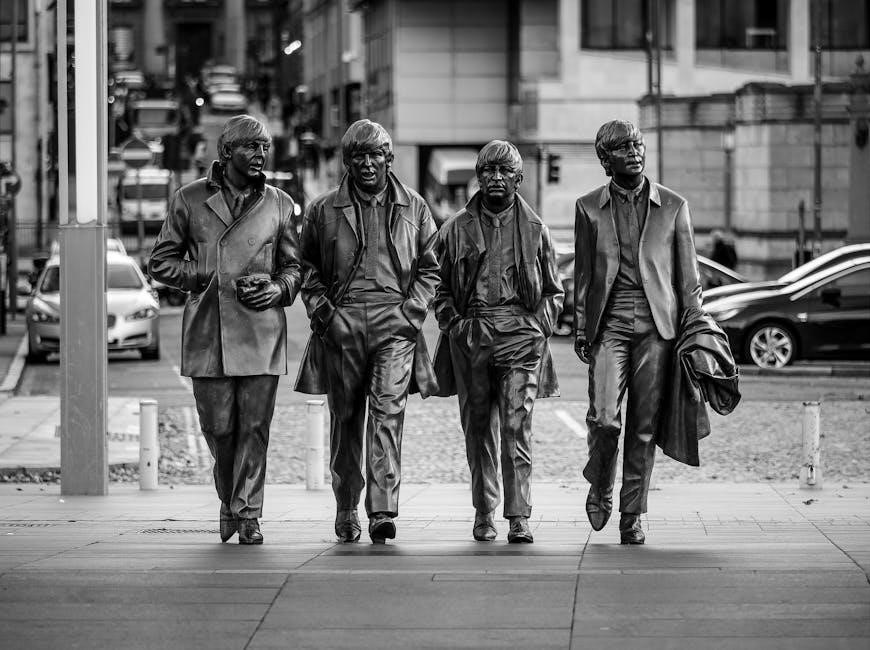Kurt Vonnegut’s Harrison Bergeron is a thought-provoking short story exploring themes of equality and individuality. Its PDF versions are widely available for academic access and analysis.
Background and Significance of the Short Story
Kurt Vonnegut’s Harrison Bergeron was first published in 1961, offering a dystopian vision of a society where absolute equality is enforced. The story critiques totalitarianism and the suppression of individuality, resonating with Cold War-era fears. Its themes of conformity and freedom remain relevant today, making it a cornerstone of American literature. The story’s exploration of enforced equality through handicaps has sparked debates about societal values. PDF versions of the story are widely used in academic settings for analysis, highlighting its enduring significance. Vonnegut’s unique satire and symbolism continue to inspire reflections on human rights and government control. The story’s relevance endures as a cautionary tale about the dangers of extreme ideologies.
Relevance of the Story in Modern Society
Harrison Bergeron remains a timely critique of societal trends, warning against the dangers of enforced conformity and excessive government control. In today’s world, where debates over equality, individuality, and freedom are prevalent, Vonnegut’s story resonates deeply. The rise of technology and surveillance states parallels the story’s themes of oppressive regulation. Additionally, the story’s exploration of how societies balance equality and individual achievement is highly relevant to modern discussions on education, economics, and social justice. Its cautionary tale about the loss of creativity and excellence due to enforced uniformity continues to provoke thought in contemporary contexts, making it a timeless reflection of human values and societal priorities.
Plot Summary and Conflict
Harrison Bergeron is set in a dystopian 2081 where extreme equality measures oppress individuality; The story follows Harrison, a gifted 14-year-old, as he rebels against a government that enforces conformity through handicaps, highlighting the clash between societal control and personal freedom.
Setting: The Dystopian World of 2081
The story unfolds in a dystopian America in the year 2081, where the government enforces absolute equality. Society is controlled by oppressive measures, ensuring no individual excels. Handicaps, such as earpieces for intelligent people and weights for strong individuals, maintain conformity. The oppressive regime uses fear and technology to suppress any form of rebellion. This bleak setting highlights a world where individuality is stifled, creating a tense atmosphere of constant surveillance and control. The dystopian backdrop serves as a warning against extreme equality and the dangers of totalitarianism, making 2081 a pivotal setting for Vonnegut’s critique of societal trends.
Central Conflict: Equality vs. Individuality
The core conflict in Harrison Bergeron revolves around the clash between enforced equality and the desire for individuality. The government mandates absolute uniformity, suppressing any form of distinction. Characters like Harrison, who possess exceptional abilities, are burdened with severe handicaps to ensure conformity. This oppressive system sparks internal and external strife, as individuals struggle between societal expectations and personal aspiration. The conflict escalates when Harrison rebels, symbolizing the fight for self-expression against a suffocating regime. Vonnegut uses this dichotomy to critique the extremes of equality, arguing that suppressing individuality leads to a loss of human potential and freedom, highlighting the tension between collective uniformity and personal identity.
Climax and Resolution: Harrison’s Rebellion
Harrison’s rebellion forms the story’s climax, as he defies the oppressive regime by seizing control of a television station. He condemns the government’s enforced equality and celebrates individuality, envisioning a society where people embrace their unique qualities. His impassioned speech and dance symbolize a fleeting moment of freedom. The resolution comes swiftly: authorities execute Harrison, restoring order. This serves as a stark reminder of the government’s ruthless control, while Harrison’s brief rebellion inspires hope and underscores the enduring tension between conformity and individuality. The PDF versions of the story emphasize the tragic consequences of his courage and its lasting impact on the narrative’s themes of freedom and resistance.

Themes and Social Commentary
Vonnegut’s Harrison Bergeron critiques enforced equality, highlighting the loss of individuality and creativity in a dystopian society. The story’s themes resonate through its exploration of freedom and conformity, with PDF study guides offering deeper insights into these societal commentaries.
Critique of Enforced Equality
Kurt Vonnegut’s Harrison Bergeron delivers a sharp critique of enforced equality, depicting a dystopian society where individuality is suppressed. The government imposes physical and mental handicaps to ensure uniformity, stifling creativity and excellence. Through this satirical lens, Vonnegut examines the consequences of extreme equality measures, suggesting they lead to societal stagnation and loss of human potential. The story questions the value of equality when it sacrifices freedom and innovation, leaving readers to ponder the balance between fairness and individuality. PDF versions of the story and analyses highlight these themes, offering insights into Vonnegut’s cautionary tale about the dangers of forced conformity.
The Dangers of Totalitarianism
Kurt Vonnegut’s Harrison Bergeron vividly portrays the dangers of totalitarianism through a government that enforces absolute control and conformity. The regime uses oppressive measures like handicaps and constant surveillance to suppress dissent, highlighting the loss of personal freedom. Vonnegut’s depiction of a society where creativity and individuality are stifled serves as a warning against authoritarian regimes. PDF versions of the story and accompanying analyses emphasize how such systems erode human potential, fostering a culture of fear and compliance. The narrative underscores the importance of resisting oppressive governance to preserve humanity’s unique qualities and maintain societal progress.
Importance of Individuality and Freedom
Kurt Vonnegut’s Harrison Bergeron emphasizes the crucial value of individuality and freedom in a society that seeks to eliminate them. The story’s protagonist, Harrison, rebels against enforced equality, symbolizing the fight for personal identity; PDF analyses reveal how Vonnegut uses Harrison’s brief yet powerful defiance to illustrate the human spirit’s need for expression. The narrative critiques a world where creativity and talent are suppressed, arguing that true progress requires embracing diversity. Vonnegut’s work serves as a timeless reminder of the importance of protecting individuality and freedom against oppressive systems that aim to homogenize society.

Characters and Their Roles
Harrison Bergeron is the rebellious protagonist fighting enforced equality, while his parents embody compliance. The government enforces conformity, highlighting the clash between individuality and oppressive control.
Harrison Bergeron: The Symbol of Rebellion
Harrison Bergeron, the 14-year-old protagonist, symbolizes rebellion against oppressive conformity. Born exceptionally intelligent and strong, he defies the government’s handicaps, embracing his individuality. His brief, fiery rebellion highlights the human spirit’s resistance to enforced equality, making him a powerful symbol of freedom. Through his tragic demise, Vonnegut critiques the suppression of individuality, emphasizing the loss of potential when conformity is prioritized. Harrison’s character serves as a catalyst for questioning societal norms, inspiring readers to reflect on the balance between equality and personal freedom. His story endures as a timeless warning against totalitarianism and a celebration of unique human potential.
The Bergeron Family: Representing Compliance
The Bergeron family embodies the societal compliance enforced in Vonnegut’s dystopian world. They accept the government’s oppressive measures without resistance, illustrating the effects of forced equality. Mr. Bergeron’s voluntary use of handicaps and Mrs. Bergeron’s passive acceptance demonstrate their submission to the regime. Their compliance contrasts sharply with Harrison’s rebellion, highlighting the tension between conformity and individuality. Through their characters, Vonnegut critiques the dangers of a society that values sameness over diversity, emphasizing how blind compliance can stifle human potential and perpetuate oppression. The Bergerons serve as a cautionary example of the consequences of unquestioned obedience to authority.
The Government: Enforcer of Equality
The government in Harrison Bergeron enforces absolute equality through oppressive measures. It imposes physical and mental handicaps to neutralize individual strengths, ensuring no one excels. This totalitarian regime uses surveillance and force to maintain conformity, suppressing any form of dissent. The government’s relentless pursuit of uniformity highlights the dangers of extreme equality, where creativity and excellence are stifled. By controlling every aspect of citizens’ lives, the government exemplifies a dystopian society where freedom is sacrificed for the illusion of fairness. Vonnegut’s portrayal serves as a warning against the risks of unchecked authority and the loss of individuality in the name of equality.
Satire, Irony, and Literary Devices
Vonnegut employs satire and irony to critique enforced equality, using exaggerated handicaps to highlight societal flaws. His unique voice and hyperbole amplify the story’s dark humor and warnings about conformity.
Vonnegut’s Use of Satire
Kurt Vonnegut employs satire in Harrison Bergeron to critique the concept of enforced equality. The story portrays a dystopian society where extreme measures ensure uniformity, mocking the idea of forced sameness. Vonnegut uses exaggerated handicaps—such as weights, earpieces, and mental disruptors—to highlight the absurdity of suppressing individuality. By exaggerating the consequences of equality, he satirizes the dangers of prioritizing conformity over human potential. The narrative’s dark humor and irony underscore the flaws in a system that devalues uniqueness. This satirical approach challenges readers to reflect on societal values, making Harrison Bergeron a timeless commentary on freedom and individuality.
Irony in the Story’s Ending
The conclusion of Harrison Bergeron is steeped in irony. Harrison’s brief, fiery rebellion against oppressive equality ends abruptly with his death, silencing his message of individuality. The Bergerons’ muted reaction to their son’s demise underscores the society’s emotional numbness. The government’s immediate suppression of the incident further highlights the system’s ruthless efficiency. The irony lies in the futility of Harrison’s sacrifice, as his defiance fails to spark lasting change. The ending leaves readers with a haunting sense of inevitability, emphasizing the overwhelming power of totalitarian regimes to crush dissent. This tragic conclusion reinforces Vonnegut’s critique of enforced conformity and its stifling impact on humanity.
Symbolism: Handicaps and Their Meaning
The handicaps in Harrison Bergeron are potent symbols of enforced equality. Heavy weights, earpieces emitting sharp noises, and physical restraints are used to suppress individual excellence. These devices represent societal efforts to homogenize talent, intelligence, and beauty, emphasizing conformity over uniqueness. Harrison’s extraordinary strength and intellect, burdened by oppressive handicaps, symbolize the suffocation of human potential under totalitarian rule. The handicaps also reflect the tension between individuality and collective uniformity, serving as a stark critique of extreme egalitarianism. Through these symbols, Vonnegut highlights the loss of freedom and creativity when society prioritizes sameness above all else, warning against the dangers of forced equality.

Style and Tone
Vonnegut’s narrative voice blends dark humor with dystopian critique, using satire to highlight societal flaws, creating a tone of grim irony and intellectual detachment.
Vonnegut’s Unique Narrative Voice
Kurt Vonnegut’s narrative voice in Harrison Bergeron is distinctively sharp and satirical, blending wit with a critical perspective on society. His use of irony and dark humor creates a tone of intellectual detachment, allowing readers to reflect on the absurdity of enforced equality. The narrator’s objective yet provocative style highlights the tension between individuality and conformity, making the story both a cautionary tale and a philosophical inquiry. Vonnegut’s voice is both accessible and profound, ensuring the story’s themes resonate with readers. This unique narrative approach has made Harrison Bergeron a timeless commentary on freedom and societal control.
Tone: Dark Humor and Social Criticism
Kurt Vonnegut’s tone in Harrison Bergeron blends dark humor with biting social criticism, creating a narrative that is both unsettling and thought-provoking. The story’s satirical edge underscores the absurdity of a society that enforces absolute equality through oppressive measures. Vonnegut’s use of irony and hyperbole amplifies the critique of totalitarianism, making the dystopian world of 2081 feel both ridiculous and terrifying. The dark humor serves as a vehicle to highlight the loss of individuality and freedom, provoking readers to reflect on the value of human uniqueness. This tone effectively balances the story’s grim themes with a sharp, intellectual wit, ensuring its enduring relevance as a cautionary tale.

Adaptations and Interpretations
Harrison Bergeron has been adapted into various forms, including screenplays and stage productions, allowing its themes to reach broader audiences and explore its dystopian message creatively.
Screen Adaptations of “Harrison Bergeron”
Harrison Bergeron has been adapted into various screen formats, including a screenplay by Chandler Tuttle, which captures the story’s dystopian essence. These adaptations bring Vonnegut’s vision to life, emphasizing themes of conformity and rebellion. The story’s visual representation enhances its satirical impact, allowing audiences to witness the oppressive society of 2081 firsthand. Screen adaptations have also sparked discussions about individuality and freedom, appealing to new generations. They remain faithful to the original narrative while exploring creative interpretations of its timeless message. These adaptations underscore the enduring relevance of Vonnegut’s critique of enforced equality and societal control.
Stage Productions and Their Impact
Stage productions of Harrison Bergeron have brought Kurt Vonnegut’s dystopian vision to life, captivating audiences with its powerful commentary on equality and individuality. These theatrical adaptations creatively interpret the story’s themes, using minimalistic sets and symbolic costumes to emphasize the oppressive nature of the society. Performances have been praised for their ability to provoke thought and spark discussions about conformity and freedom. The emotional depth of characters like Harrison Bergeron and Hazel Bergeron is highlighted, resonating deeply with viewers. Stage productions not only entertain but also educate, making the story’s message accessible to a broader audience and fostering a deeper understanding of its social critique.
Historical Context
Kurt Vonnegut wrote Harrison Bergeron in 1961, reflecting Cold War-era fears of conformity and totalitarianism. The story critiques societal pressures of the time, highlighting tensions between individuality and enforced equality.
Vonnegut’s Inspiration and Influences
Kurt Vonnegut’s Harrison Bergeron was influenced by the Cold War era’s political climate and rising concerns about totalitarianism. Vonnegut’s experiences in World War II, including his captivity in Dresden, shaped his views on freedom and conformity. The story reflects 1960s societal debates on individuality versus collective equality. Vonnegut’s satirical style was also influenced by literary traditions of dystopian fiction, emphasizing the dangers of extreme ideologies; His unique narrative voice and use of irony were further refined by his background in journalism and his critiques of modern society. These influences converge in Harrison Bergeron, creating a powerful allegory about the tension between equality and individuality.
Relevance to 1960s American Society
Kurt Vonnegut’s Harrison Bergeron, published in 1961, resonated deeply with the societal tensions of 1960s America. The story critiques enforced equality, reflecting debates on civil rights and individual freedom. Its portrayal of a dystopian society where individuality is suppressed mirrored fears of communism’s emphasis on conformity. The 1960s were marked by social upheaval, including the Civil Rights Movement and growing anti-war sentiment, making Vonnegut’s exploration of freedom versus equality particularly relevant. The story’s themes of rebellion and conformity also aligned with the era’s counterculture movement. PDF versions of the story remain a vital resource for studying these historical and thematic connections, offering insights into Vonnegut’s prophetic vision of societal trends.

Critical Reception
Kurt Vonnegut’s Harrison Bergeron has received widespread acclaim for its biting satire and thought-provoking commentary on equality and freedom. The story’s exploration of dystopian themes resonates deeply, making it a timeless classic. PDF versions are widely accessed for academic analysis.
Positive Reviews and Praise
Kurt Vonnegut’s Harrison Bergeron has garnered widespread critical acclaim for its profound exploration of equality, individuality, and societal conformity. The story’s satirical tone and ironic twists have been praised for their thought-provoking nature. Many reviewers highlight its relevance in sparking discussions about freedom and the dangers of enforced uniformity. The narrative’s vivid imagery and symbolic handicaps resonate deeply, making it a timeless classic in dystopian literature. PDF versions of the story are widely sought after for academic analysis and study guides, further cementing its importance in educational contexts. Vonnegut’s unique voice and sharp commentary continue to inspire readers and scholars alike.
Negative Criticisms and Controversies
Kurt Vonnegut’s Harrison Bergeron has faced criticism for its overly simplistic portrayal of equality and individuality. Some argue the story oversimplifies complex societal issues, offering a binary view of freedom versus equality. Political theorists have criticized its depiction of government control, claiming it lacks depth and nuance. Additionally, the story’s brevity has led to accusations of underdeveloped characters and a rushed narrative. Certain educators and readers have questioned its suitability in classrooms, citing its radical perspective on conformity as potentially polarizing. Despite these criticisms, the story remains a significant work in dystopian literature, sparking debates about its implications and relevance in modern discourse.
Educational Resources
Harrison Bergeron PDFs are widely accessible through academic platforms like libraries and online databases, offering study guides and analysis for deeper understanding of Vonnegut’s work.
Study Guides and Analysis
Study guides and analyses of Harrison Bergeron are readily available in PDF formats, offering in-depth insights into Vonnegut’s themes, characters, and literary devices; These resources, often found on academic platforms like library databases and educational websites, provide detailed breakdowns of the story’s plot, symbolism, and social commentary. For instance, analyses on pages 39, 48, and 52 of various PDF guides explore the critique of enforced equality and the role of individuality. These materials are invaluable for students and educators seeking to understand the story’s complexity and relevance in modern society. They also include discussion points and activities to enhance learning and critical thinking.
PDF Versions and Availability
PDF versions of Harrison Bergeron are accessible through various platforms, including academic databases and online libraries. Centralia College’s Kirk Library, for instance, offers these resources to students and researchers. Users can access these PDFs by logging in with their credentials, ensuring easy availability for academic purposes. Additionally, interlibrary loan services allow users to request materials that may not be immediately available. These PDFs often include the full text of the story, along with study guides and analyses, making them a comprehensive resource for understanding Vonnegut’s work. They are a valuable tool for both individual and classroom-based study.
Harrison Bergeron remains a timeless critique of enforced equality and conformity. Kurt Vonnegut’s exploration of individuality and freedom continues to resonate, offering a cautionary vision of society’s potential extremes. The story’s themes are as relevant today as they were when first published, making it a cornerstone of dystopian literature. Its availability in PDF formats ensures accessibility for readers and scholars, preserving its legacy as a powerful commentary on human rights and societal structures. Vonnegut’s work challenges us to reflect on our values, ensuring Harrison Bergeron remains a vital part of literary discourse.
Final Thoughts on the Story’s Message
Kurt Vonnegut’s Harrison Bergeron delivers a powerful critique of enforced equality, warning against the loss of individuality and freedom. The story’s exploration of a dystopian society where conformity is mandated highlights the dangers of suppressing human potential. Through Harrison’s tragic rebellion, Vonnegut emphasizes the importance of embracing diversity and rejecting oppressive systems. The story’s message remains timeless, urging readers to value creativity and intellectual freedom. Its availability in PDF formats ensures that Vonnegut’s cautionary tale continues to inspire reflection on societal values and the importance of preserving individuality. This ensures its enduring relevance in modern discourse.
Legacy of “Harrison Bergeron” in Literature
Kurt Vonnegut’s Harrison Bergeron stands as a landmark in dystopian literature, offering a searing critique of enforced equality and conformity. Its exploration of themes such as individuality, freedom, and totalitarianism has left a lasting impact on literary discourse. The story’s concise yet powerful narrative has influenced countless authors and adaptations, cementing its place in American literary canon. Its availability in PDF formats has made it accessible to scholars and readers worldwide, ensuring its continued relevance. Harrison Bergeron remains a vital warning against the suppression of human potential, solidifying Vonnegut’s legacy as a visionary writer.

